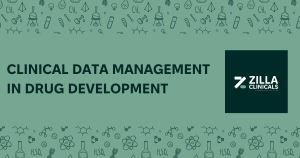
Clinical data management (CDM) is the process of collecting and managing research data in accordance with regulatory standards in order to obtain high-quality, error-free information. The goal is to collect as much data for analysis as possible while adhering to federal, state, and local regulations. Clinical data management (CDM) is critical to the success of any trial because it has a direct impact on treatment development decisions and, thus, patient health. That is why regulatory bodies enforce strict standards and guidelines for clinical data. Data that is properly utilised can aid in the development of life-changing medical treatments. Clinical data is critical in determining a drug’s safety and efficacy. With massive amounts of clinical trial data being generated, efficient data-capture tools are critical for ensuring high- quality data for accurate drug evaluation and accelerating the drug discovery and development process. The current global drug market is driving pharmaceutical companies to find new ways to reduce drug development timelines and increase productivity. In this article, we will look at how CDM relates to drug development, as well as the key stages and tools that make it successful.
Clinical Data Management Systems are tools used in clinical research to manage the data of a clinical trial. The case report forms and clinical trial data collected at the investigator site are kept in the CDMS. The systems use a variety of techniques to validate the data in order to lessen the likelihood of errors resulting from human entry. CDMS uses compliant software in electronic records to store, capture, protect, and query data. CDMS are preferred over paper- based data capture due to their accuracy, consistency, reliability, and auditability. However, universal adoption has been hampered primarily by the high cost, which academic institutions and small biotechnology companies cannot afford. Commercial systems are often prohibitively expensive, costing hundreds of thousands of dollars depending on the size of the trial and the number of licenses required. There are numerous software tools available for data management, known as Clinical Data Management Systems (CDMS).
A CDMS has become essential in multicentric trials to manage the massive amounts of data. The majority of CDMS used in pharmaceutical companies are commercial, but there are a few open source options as well. In terms of functionality, these software tools are more or less similar, with no significant advantage to one system over another. In regulatory submission studies, maintaining an audit trail of data management activities is critical. These CDM tools maintain an audit trail and assist in the management of discrepancies. This ensures that each user can only use the functionalities assigned to their user ID and cannot make any other changes to the database.
REGULATIONS, GUIDELINES, AND STANDARDS OF CDM IN DRUG
DEVELOPMENT
Clinical Data Management (CDM), like other areas of clinical research, requires adherence to guidelines and standards. Because the pharmaceutical industry relies on electronically captured data to evaluate medicines, it is critical to adhere to best CDM practices and maintain electronic data capture standards. These electronic records must comply with a Code of Federal Regulations (CFR), 21 CFR Part 11. This regulation applies to electronic records that are created, modified, stored, archived, retrieved, or transmitted. This necessitates the use of validated systems to ensure data accuracy, reliability, and consistency, as well as secure, computer-generated audit trails that independently record the date and time of operator entries and actions that create, modify, or delete electronic records.
Today, pharmaceutical companies want to enter all major markets with their drugs as soon as possible, so they conduct global development programmes that include clinical studies conducted in multinational settings almost all over the world. Typically, multiple subsidiaries contribute to such a programme. International teams are formed and assigned responsibility for specific tasks within the clinical project. A project biometrical team would be in charge of biostatistics and data management, which would include project and study biostatisticians and data managers. In the biopharmaceutical industry, converting clinical data into meaningful information is crucial for sponsor firms. This allows for faster and more flexible assessments of compounds in development, better clinical protocols tailored to specific target populations, and innovative study initiatives and programmes to ensure a robust clinical product pipeline.
Clinical data management (CDM) is an important cross-functional tool in clinical trials that ensures high-quality data is captured by site staff using a paper case report form (CRF) or an electronic case report form (eCRF) and made available for early review. As a result, biopharmaceutical companies have been making significant changes in reassessing their IVRS, CDMS, clinical trial management system (CTMS), and clinical safety system (CSS) to meet the growing needs and demands. Multiple vendors provide such systems in commercial software packages. Customising, configuring, and integrating systems in a sponsor’s e- clinical environment can improve clinical efficiency and quality. Standardisation and workflow management are critical as everything becomes more complex and time is of the essence.
CDM has evolved in response to the growing demand from pharmaceutical companies to expedite the drug development process and from regulatory authorities to implement quality systems to ensure the generation of high-quality data for accurate drug assessment. To meet expectations, a gradual shift is occurring from paper-based to electronic data management systems and even AI intervention. Technological developments have had a positive impact on the CDM process and systems, resulting in encouraging results in terms of data speed and quality. Ensuring data integrity throughout a clinical research study has never been more important. Correct data management guarantees that a dataset is accurate, secure, dependable, and ready for analysis. Zilla Clinicals is the perfect partner to assist your organisation with any or all of its data, ensuring a robust and usable data set at the conclusion of your trials. We fully comply with the US FDA’s 21 CFR Part 11 requirements, and our data management systems are specifically designed to support e-clinical systems.
Contact us to find out more about how we can help you.